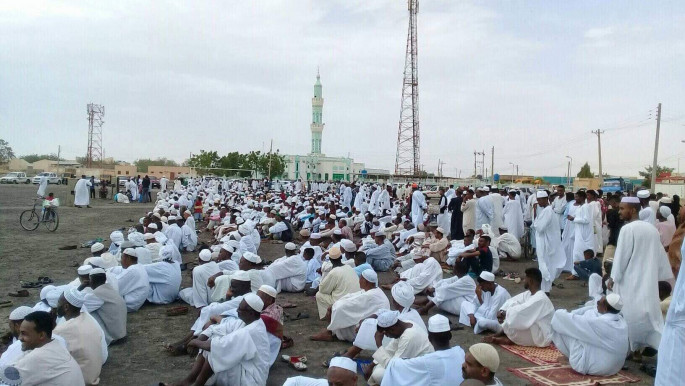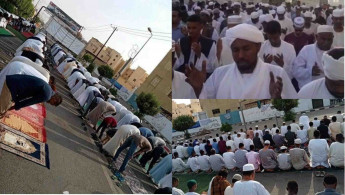Sudan protesters mark Eid with funeral prayers after Khartoum massacre
The timing of the demonstrators' commemoration is a symbol of how much civilians are divided from the country's military rulers.
The beginning and end of Ramadan is announced by scholars upon the sighting of a new crescent moon.
Both the first day of fasting and the beginning of Eid often differ across the world, with Saudi Arabia and Turkey starting celebrations on Tuesday this year and Morocco and Egypt holding out for another day of fasting until Eid begins on Wednesday.
But the timing of Eid rarely differs within one nation.
|
|
This year, Yemenis in areas controlled by the Houthi rebels will begin Eid on Wednesday, while their compatriots in areas under the authority of the Saudi-backed government began Eid on Tuesday.
In Sudan, the military junta announced Eid would begin on Wednesday, according to state news agency SUNA.
Protest leaders the Sudanese Professionals Association (SPA), however, declared Eid would start on Tuesday.
The opposition umbrella group called for a wide-ranging "civil disobedience" campaign and strike in the wake of Monday's killings.
The SPA also called for continued peaceful protests throughout Sudan.
Eyewitnesses reported that armed forces - in particular the Rapid Support Forces (RSF) led by the military junta's deputy leader - were still patrolling the streets of Sudan on Tuesday morning, allegedly beating, arresting and shooting at anyone outside.
Those dangerous circumstances have made many petrified to leave their homes, activists said.
Despite that, a select few have come out across the country to pray the traditional communal Eid prayer.
In some locations, that prayer was combined with the "salat al-ghaib" or "absentee funeral prayer", an alternative funeral prayer for when the dead cannot be buried or their bodies cannot be found.
Tens of civilians in Shambat, North Khartoum came together for joint Eid and absentee funeral prayers, a video distributed on social media showed.
Protesters in the Khartoum neighborhood of Gabra were also pictured making dhikr (short repeated phrases or prayers in praise of God) while preparing for the Eid prayer.
Another video showed demonstrators taking to the streets of Omdurman after the Eid prayer, chanting revolutionary slogans.
Worshippers also gathered in al-Douiem, a city in southern Sudan, and Port Sudan to pray both the Eid and absentee funeral prayers, according to photos posted on social media.
The southern city of Kosti and Khartoum neighbourhood Burri were also among the locations in which tens of civilians came together for the Eid prayer.
 |
| Worshippers gather for Eid prayers in al-Douiem, a city in White Nile state, Sudan [Twitter] |
Sudanese expatriates in the Qatari capital Doha also came together to pray the Eid and absentee funeral prayers.
In a video distributed on social media, protesters declared it was a revolutionary act to begin Eid on Tuesday.
"Anyone not fasting is a revolutionary and those who are fasting are keizan," they shouted.
Keizan is derogatory term used to describe members and supporters of former President Omar al-Bashir's Islamist regime.





 Follow the Middle East's top stories in English at The New Arab on Google News
Follow the Middle East's top stories in English at The New Arab on Google News
![Israeli forces ordered bombed Gaza's Jabalia, ordering residents to leave [Getty]](/sites/default/files/styles/image_330x185/public/2176418030.jpeg?h=a5f2f23a&itok=_YGZaP1z)

